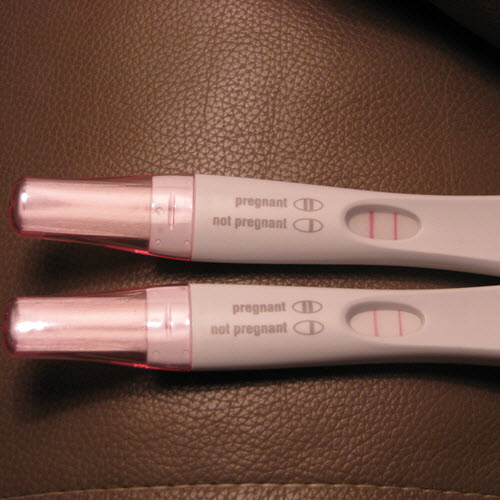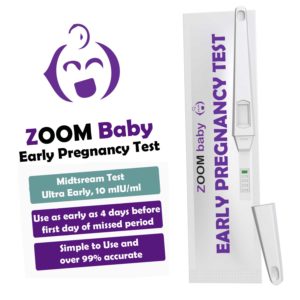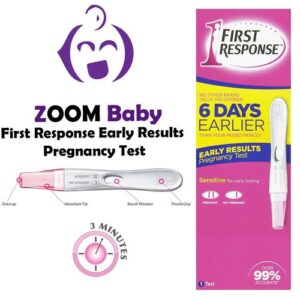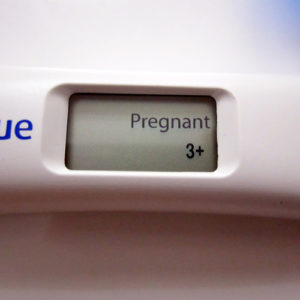Early pregnancy tests are acutely more sensitive than the standard pregnancy test kits available. The early detection pregnancy test is able to distinguish low levels of the hCG hormone (human chorionic gonadotropin) and detect if a female is pregnant in the early stages even before she has missed her period. During the early stages of pregnancy, the hormone hCG is released in large amounts and multiplies quickly. It is found in the female’s urine.
Most often, a typical home pregnancy test will produce a positive result as soon as the hCG hormone gets to a level of 25mIU within the urine. However, an early detection pregnancy test will produce a positive result once the hCG level gets to a mere 10mIU within the urine which makes it far superior and more sensitive to a regular home test. Using an early detection pregnancy test will reveal a positive result much quicker and can be detected as early as 8 – 10 days following ovulation.
How early can an early pregnancy test detect pregnancy?
The sensitivity of early pregnancy tests varies, but some can detect a pregnancy very early on.
- Tests that detect 20 mIU/ml of hCG can identify a pregnancy as early as 7-10 days after conception. This is before a missed period.
- Tests that detect 10 mIU/ml of hCG can detect a pregnancy around 3-4 days before a missed period. This is around 9-10 days after conception.
So the most sensitive tests can potentially confirm a pregnancy just over a week after conception takes place. However, levels of hCG rise at different speeds in different women, so the exact day that an early test turns positive depends on the individual.
It’s also worth noting that the higher the sensitivity of the test, the more chance there is of getting false positive test results. Levels under 25 mIU/ml could potentially be normal fluctuations rather than pregnancy. So early positive results should ideally be confirmed by testing again a few days later when hCG levels have risen further.
When is the optimum time to take an early pregnancy test?
For the most accurate results, take an early pregnancy test:
- First thing in the morning, when hCG levels are highest. Don’t drink too much liquid beforehand.
- Follow the test instructions carefully.
- Try not to take the test too early, before levels of hCG will be high enough. For very early testing, look for a test sensitive to at least 10 mIU/ml hCG.
- If you get a negative result but still think you may be pregnant, wait 2-3 days before testing again. HCG levels double every 48 hours in early pregnancy.
How do early pregnancy tests work?
Early pregnancy tests detect the pregnancy hormone hCG (human chorionic gonadotropin) in urine. Here’s how they work:
- Collect a sample of urine.
- Dip the absorbent tip of the test stick in the urine sample for a few seconds. Some tests require a midstream urine sample instead.
- The urine travels up the absorbent strip to the result window.
- If hCG is present, it will bind to antibodies on the test strip and trigger a colour change in the result window.
- A coloured line in the result window means the test is positive.
The intensity of the coloured line depends on the level of hCG detected. Early pregnancy tests use antibodies that are extremely sensitive to hCG, allowing them to detect very low levels.
Are early pregnancy tests inaccurate or unreliable?
Early pregnancy tests are generally very accurate when used properly. However, inaccurate results can occur due to:
- Very early testing before hCG levels are high enough.
- Diluted urine from too much fluid intake.
- Testing in the afternoon when hCG levels are lower.
- Expired tests.
- Not following the instructions correctly.
So for the most reliable results, use the test as recommended and repeat it a few days later if still unsure. See a doctor for confirmation of any positive test result.
How to use Early Pregnancy Tests
In order to complete an early detection pregnancy test, you simply dip the strip in a sample of urine and wait a few moments for the results. Every pack includes a full set of instructions and these should be followed if you want accurate pregnancy test results. A midstream test works slightly differently, instead you hold the test stick for few seconds in your urine stream. You then wait for the results.
The peak concentration level of hCG hormone is highest first thing in the morning; therefore it’s crucial to test your first pass of urine upon waking to obtain a more accurate test. This way you will achieve a much greater chance of indeed detecting a pregnancy. Throughout the day, the hormone level will diminish and so will your ability to detect how much is in your urine; therefore reducing your chances of discovering whether you are pregnant or not. Most pregnancy tests are highly reliable, but no test will give your 100% reliable results.
Pros and Cons to using an Early Pregnancy Tests
Benefits of using Early Pregnancy Tests
– The strips are super easy to use
– You will discover you are pregnant much sooner
– The strips successfully detect low levels of hCG pregnancy hormone
– The strips are cost effective and provide a great value for the money
Downside to Using Early Pregnancy Tests
– Since the hCG hormone level may not be elevated enough in the urine even when using a sensitive early detection test, more false negatives may result.
– If the test is successful at detecting your early pregnancy, but something unfortunate however should occur, you would have been none the wiser concerning your pregnancy.
– At times you may be required to repeat the test again and again until you achieve a positive result or until your period commences.
Our recommended Early Pregnancy Tests
Zoom Baby Early Pregnancy Tests are very popular. They feature a 3.5mm wide test strip which makes them easy to interpret. They are also very competitively priced, making them much cheaper than any equivalent tests that you might find in the shops!
Photo Credit: “Pregnant” (CC BY 2.0) by funbobseye
Zoom Baby is a leading supplier of Pregnancy Tests and Ovulation Test Kits







